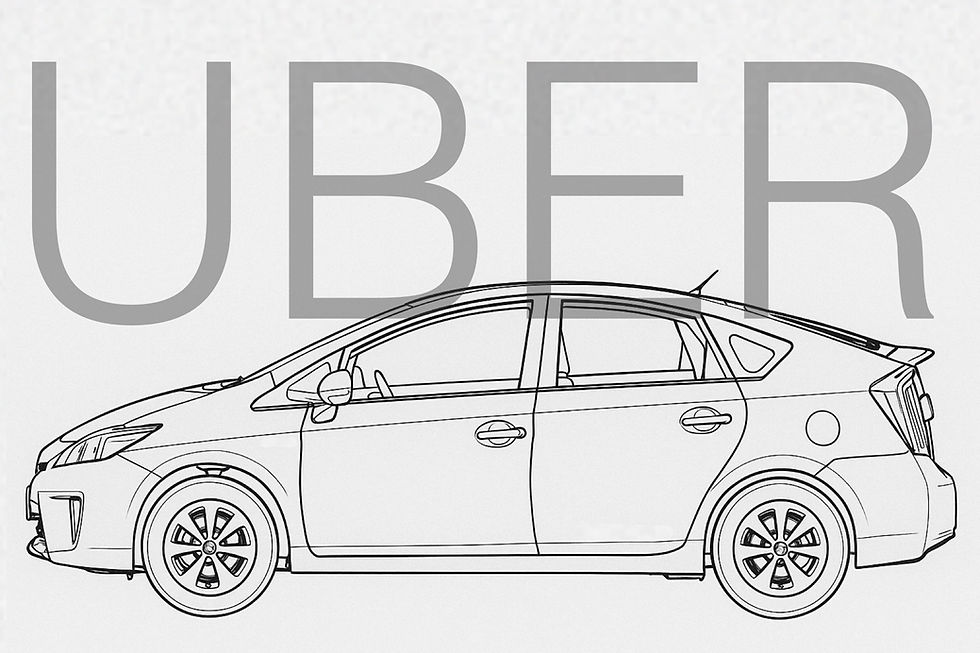EVIDENCE REVEALED: Uber asks for national standards and pushes back against cross-border restrictions
- Perry Richardson

- Sep 19, 2025
- 3 min read

Uber has called for legally binding national standards for private hire licensing across England, arguing that a uniform approach would improve safety, enforcement and reliability.
In written evidence to the Transport Committee’s inquiry, the firm says statutory guidance is applied inconsistently by more than 270 licensing authorities and should be replaced with detailed standards set in law.
The submission sets out four headline asks. First, national standards that define how background checks are assessed, including which offences bar a licence. Second, a single approach to categorising and reporting safety complaints, with operators required to share data with authorities. Third, clear rules to enable wider use of in-car video. Fourth, legal changes giving all local officers the right to enforce against any licensed driver, regardless of where they were licensed.
In the evidence provided, Uber says the sector is generally well regulated, but process and policy differences between councils create a patchwork that is inefficient for operators and confusing for drivers and passengers. It points to variable approaches on vehicle livery and CCTV, divergent processing times and fees, and inconsistent incident reporting requirements. The company argues that the same high bar should apply everywhere, with local bodies focused on delivery and enforcement rather than interpreting guidance.
On data and oversight, Uber backs a national, operator-accessible database of all currently licensed drivers and vehicles. It says some councils publish digital licence lists that can be checked several times a day, while others still communicate suspensions by email, creating risk of delay and error. The submission also suggests mandatory update timeframes and better system integration for the NR3S database, alongside secure operator access, to improve the flow of licensing information. Transport for London’s online checker is cited as best practice to build on nationally.
CCTV policy is highlighted as uneven. Uber says restrictive “approved device” lists, ambiguous privacy guidance and concerns about data-controller duties have limited uptake. The company calls for national product and installation standards, and sector-specific guidance developed by the Department for Transport and the Information Commissioner’s Office. Uber notes it has launched in-app video and audio recording tools in North and Latin America that encrypt footage on a driver’s device and make it accessible to Uber only if a safety incident is reported. In the UK, drivers with existing recording devices can register them in-app so passengers are notified before pick-up.
The evidence also pushes back on proposals to restrict cross-border driving. Uber says such limits would reduce availability around authority boundaries, lengthen waits and risk more illegal plying for hire. It estimates that, across the major Mayoral Combined Authorities, a ban would block more than 28 million journeys, affect almost 4 million passengers, sideline over 50,000 drivers and remove about £250 million in earnings. The company supports harmonised standards and stronger, universal enforcement powers in place of geographic restrictions.
Uber frames technology as central to improving safety and compliance. It cites GPS trip tracking, PIN verification and facial verification to prevent account misuse, plus direct integrations with DVSA and insurers to confirm vehicle certifications and active cover. The firm reports that 99.9% of trips globally conclude without a safety incident, while noting that operators should be mandated to share safety complaint data to enable continuous assessment of licence fitness.
Looking ahead, Uber says autonomous vehicles will enter service gradually and should sit within a robust permitting regime that mirrors private hire’s safety expectations. Uber recently announced plans with Wayve for an AV pilot in London. It urges rigorous pre-deployment approvals and ongoing audits once services begin.
The submission focuses on the introduction of national standards, clearer CCTV rules, shared licensing data and cross-jurisdictional enforcement as key to raising consistency without undermining service availability. Uber says it stands ready to work with government, authorities and safety partners on detailed design and implementation.
RELATED PREMIUM CONTENT:








